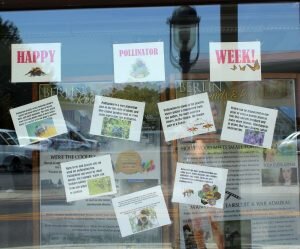By Ally Lanasa, Staff Writer
(July 9, 2020) Berlin might have observed National Pollinator Week from June 22-28, but the buzz in town was toned down somewhat by the distancing requirements necessitated by the efforts to curtail the spread of covid-19.
As a Bee City USA affiliate, the town did everything it could safely do to educate the public about the link between pollinators and a healthy planet.
Town Administrator Jeff Fleetwood said during the June 22 Town Council meeting that Berlin would have fun facts about pollination in the shop windows and on social media in lieu of public events.
Economic & Community Development Director Ivy Wells said people could also obtain information about creating pollinator gardens at the Welcome Center as well as via social media posts.

ALLY LANASA/BAYSIDE GAZETTE
The Berlin Welcome Center posted facts about bees and the significance of pollination in the food supply chain as part of its observance of National Pollinator Week as a Bee City affiliate.
The Town of Berlin Maryland Facebook page shared a digital booklet from U.S. Fish & Wildlife Service about attracting pollinators to gardens.
The use of native flowering plants will attract a variety of pollinators such as hummingbirds, bumble bees, soldier beetles, hummingbird moths and butterflies.
Bee City Designation Committee members Mike and Helen Wiley’s daughter, Stacey Wildberger, published a blog post on the Cape Conservation Corps website on June 23, which highlighted the importance of planting for specific pollinators.
“Many species have developed a specialist relationship with a particular family or even species of plant for life sustaining purposes,” she wrote. “Without having their particular plant species, they will not survive. There are generalist species that can feed on a wild variety of plants while the specialists are limited to specific plants.”
Wildberger designed the pollinator garden on her parents’ property in Berlin with swamp milkweed for butterflies, native honeysuckle for hummingbirds as well as serviceberry and black-eyed susans for bees.
Currently, there are public pollinator gardens at Henry Park, Heron Park, Stephen Decatur Park and the town’s spray irrigation site.
To protect pollinators, gardeners should avoid the use of pesticides. Rather, the U.S. Fish & Wildlife Service advises creating a diverse garden habitat for natural pest control.
Pollination is essential to the food system and has many environmental benefits.
According to the U.S. Forest Service, pollinators are vital to more than 150 food crops in the U.S., including blueberries, wild strawberries, apples, oranges, squash, tomatoes, sunflower seeds and almonds.
In addition, pollination’s role in producing healthy plants helps to provide clean air, purer water and preventing erosion.
For more information, visit berlinmd.gov/save-the-bees/.
